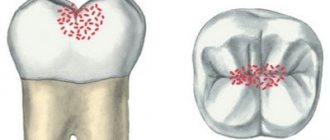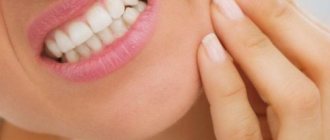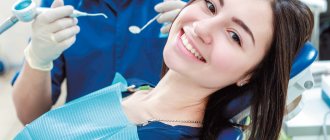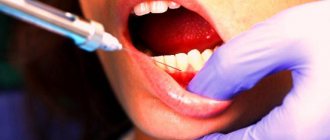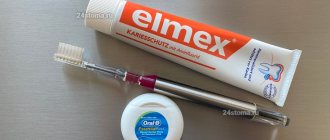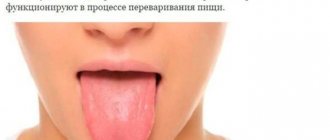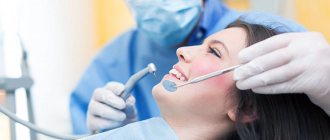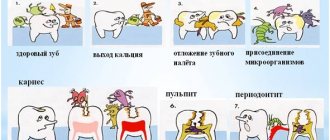From this article you will learn:
- Why does caries occur in pregnant women?
- Why is it necessary for pregnant women to treat caries?
- When to treat caries during pregnancy
- Nuances of treatment during pregnancy
- Anesthesia
- Prevention of caries during pregnancy
Treatment of dental caries in pregnant women and other oral diseases is carried out without fail, but taking into account the risks and characteristics of the pregnant woman’s body.
When planning a pregnancy, women are advised to have their teeth treated in advance, even before conceiving a child. If pregnancy does not occur as planned, dental treatment is still required to eliminate foci of chronic infection. To do this, doctors recommend specific dates when it is safest to treat caries during pregnancy.
Why does dental health worsen during pregnancy?
As soon as a woman finds out she is pregnant, she should take extra care of her teeth and visit the dentist regularly. Caries at any stage is common, and it is important to prevent its occurrence or treat it at the initial stage.
In this article
- Why does dental health worsen during pregnancy?
- The effect of caries on pregnancy
- Treatments that are suitable for pregnant women
- Do pregnant women undergo anesthesia and X-rays?
- Features of caries treatment in different trimesters
- Is it possible to have teeth removed during pregnancy?
- Prevention of caries during pregnancy
Why are pregnant women’s teeth more susceptible to caries than others? There is an opinion that the fetus developing in the womb “takes” all the calcium from the mother’s teeth, which leads to caries in pregnant women. In fact, this is nothing more than a myth. And the real reasons for the development of dental caries during pregnancy are completely different.
- Changing eating habits
Pregnant women often change their taste habits and diet towards the “wrong” ones. Either they want something sweet, or they crave something sour. In the early stages of toxicosis, sometimes there is no desire to eat anything at all, and in the later stages, in order to drown out heartburn, the pregnant woman constantly chews something. Such changes in diet cannot but affect the condition of the teeth. The risk of developing caries during pregnancy especially increases when a woman eats a lot of carbohydrate and sweet foods. It serves as a food source for cariogenic bacteria, which convert sugar into acid that is destructive to tooth enamel. Frequent meals cause food to remain in the mouth for a long time and create excellent conditions for the growth of microbes.
- Toxicosis
This unpleasant condition in pregnant women is often accompanied by vomiting. These masses contain a large amount of hydrochloric acid, which is harmful to tooth enamel. It damages its structure, making it thinner, more fragile and permeable to bacteria. To prevent the harmful effects of hydrochloric acid on teeth, it is recommended to rinse your mouth with a soda solution after vomiting.
- Hormonal changes
During pregnancy, the amount and composition of hormones in the female body changes. Against this background, a decrease in immunity occurs, and the composition of saliva also changes. If in normal times it has a powerful bactericidal effect and effectively fights cariogenic bacteria, then during pregnancy its disinfecting properties are noticeably reduced. This promotes the active proliferation of microorganisms in the oral cavity and increased formation of dental plaque.
- Improper hygiene
This is one of the most common causes of caries, and it is not always associated specifically with pregnancy. But it has been noticed that pregnant women, due to poor health, toxicosis, fatigue and other reasons, begin to pay less attention to proper teeth brushing and oral care, which can contribute to the development of caries.
- Lack of minerals
Although the fetus, as we already know, contains calcium from the mother’s teeth, this important microelement is extremely necessary for the development of its skeletal system. Therefore, from the nutrition that a pregnant woman receives, part of the nutrients goes to the development of the fetus. As a result, the concentration of minerals in the blood and saliva decreases, which leads to demineralization of the enamel - the first stage in the development of carious lesions. This is why it is so important during pregnancy to increase the intake of minerals into the body by adjusting the diet or taking special vitamin and mineral complexes.
Can X-rays and anesthesia be used?
Does radiation affect pregnancy during caries, how to protect the baby in the womb from harmful effects?
Sometimes this method cannot be avoided during therapy, but it is contraindicated during pregnancy. In rare cases, exceptions are possible, but doctors still try not to address them. Modern equipment used in the Dentika clinic provides minimal radiation doses when using special sensors. If the dentist nevertheless decides to carry out the procedure, the pregnant woman is put on a special lead apron to protect the little person inside. And even with such protective measures, such diagnostics are categorically not recommended.
As for anesthesia, everything is more flexible here. During the gestational period, local agents (external gels and ointments, injections into the gums) are welcome. They are indicated no earlier than from the 14th week, that is, upon completion of the process of formation of the placenta, which protects the baby from external factors.
The effect of caries on pregnancy
Another common reason for the development of caries in pregnant women is that women are afraid to have their teeth treated while pregnant. There is a popular myth that caries cannot be treated for any period of time, allegedly it can harm the fetus. As a result, a woman can walk with caries for nine months, which during this time can move from the initial stage of the stain to a complicated form or pulpitis.
American scientists conducted a study and found that there is a direct connection between the amount of cariogenic bacteria in the oral cavity and premature birth or the birth of a child with low body weight. There is a hypothesis that the same bacteria contribute to the production of cytokines in the body of a pregnant woman - special substances that cause dilation of the cervical canal and contraction of the uterus itself. The greater the expansion of the canal, the greater the likelihood of premature birth.
Complications of caries, in particular pulpitis and periodontitis, can also affect the fetus. When the dental pulp becomes inflamed, the pathological process often spreads beyond the boundaries of the tooth. Toxins enter the blood and are carried by its current to other organs, in particular they reach the fetus and can negatively affect its development.
Thus, dental caries can be dangerous for a child, so diseased teeth should definitely be treated. Moreover, in pregnant women, the destruction of dental tissue occurs very quickly. It can take just a few weeks or months from the spot stage to deep caries.
When asked whether it is possible to treat teeth for pregnant women, dentists unanimously say: treatment of caries during pregnancy is acceptable and even necessary. The doctor will simply select methods and drugs approved for use in pregnant women.
Experts' opinion
The study of the clinical effectiveness of treatment and prophylactic products of the Asepta line in the treatment of inflammatory periodontal diseases, carried out in the department of periodontology of the Central Research Institute of Dentistry and Maxillofacial Surgery of Rosmedtekhnologii in Moscow, made it possible to prove the effectiveness of many of the products in the line.
Analysis of the results obtained revealed a fairly high effectiveness of Asepta gum balm and Asepta mouth rinse for moderate periodontitis. Gum gel and Asepta rinse also turned out to be effective. In addition, no phenomena of mucosal irritation or brown staining of fillings were recorded. This indicates that the use of this rinse for a two-week period provides an obvious clinical effect in the absence of negative side effects.
Treatments that are suitable for pregnant women
If caries is detected at the spot stage, it can be treated with conservative methods without anesthesia, which will not cause the patient any pain or discomfort.
- Remineralization.
Tooth enamel is coated with gels containing large amounts of zinc, phosphorus, and calcium, while remineralizing compounds are applied not only to the lesion, but also to healthy enamel.
- Fluoridation.
The procedure is similar to the previous one, but the teeth are treated with fluoride-containing compounds. Fluorides strengthen tooth enamel and increase its resistance to cariogenic factors.
- Infiltration method.
A relatively new treatment method in which the stain is first treated with an etching gel, and after it is washed off and dried, a special substance, like a liquid filling, is applied to the surface, which seals the pores of the tooth. If a pregnant woman is diagnosed with medium or deep stage caries, it is too late to treat with conservative methods. In this case, surgical treatment will be required. The carious cavity is prepared with a drill, the affected tissue is removed and, after preliminary preparation of the cavity, it is closed with a filling.
Modern dentistry offers laser treatment as an alternative option. This method requires that the tooth is prepared not with a drill, but with a laser beam. The procedure is non-invasive and painless. The doctor determines which method is appropriate to use in each specific case.
Consumer Reviews
tancha66 about Asepta Fresh mouth rinse
“Today I would like to dedicate my review to a product that helped me solve the problem of bleeding and painful gums, as well as temporarily reduce toothache. We will talk about Asepta parodontal mouth rinse, and its two varieties - fresh and activ.
From time to time I am concerned about the problem of bleeding and inflammation of the gums, increased sensitivity of tooth enamel, and therefore my attention is always attracted to oral care products. And then I had a toothache, and my appointment with the dentist was only 10 days later. While visiting friends, I noticed a cute bottle - Asepta Fresh mouthwash, which they highly praised and recommended. Naturally, the rinse aid was purchased on the same day.
The bottle is made of durable blue plastic and transparent. My volume is 250 ml. The top is screwed on with a white cap, onto which a transparent measuring cap is placed, this is very convenient. The rinse itself is colorless, transparent, with a pleasant aroma and taste of mint (menthol). The mouthwash is intended for daily use...
...Use as you would any mouthwash. After shaking the bottle, pour 10 ml of mouthwash into the measuring cap and rinse your mouth for 20 seconds. I used the mouthwash 2-3 times a day. After just two or three days, the gums practically stopped bleeding, the swelling and pain decreased. But the toothache periodically made itself felt - this is understandable - a simple mouthwash will not help here, and only painkillers helped.
When I went to the pharmacy again, I noticed this box:
This is also Asepta mouth rinse, but not fresh, but activ. I asked to read the summary. It turned out that this rinse is not intended for daily use, but is used in cases where it is necessary to quickly relieve inflammation, reduce pain in diseases of the oral cavity, a kind of first aid. You can use it only for 5-7 days. What caught my attention and made me very happy was the line: the area of application is toothache of infectious origin. I don’t know yet what the origin of my toothache is), but I also immediately bought this mouthwash. A volume of 150 ml costs 240 rubles.
So, Asepta paradontal activ mouth rinse is sold in a nice box, which contains detailed information about the action of the rinse...
...My feelings after using Asepta paradontal activ mouthwash.
I rinsed my mouth for a week, sometimes twice, sometimes three times a day. This bottle just lasted me 7 days, with a little left at the bottom. Rinse as stated in the instructions for 20 seconds. After the procedure, numbness of the tongue and gums is felt in the mouth, which lasts for 15-20 minutes. The freshness of breath after this rinse lasts longer than after using Asept frash. Not immediately, but gradually, the toothache decreased and almost disappeared. But if you take into account how acute it was, I conclude that Asepta paradontal activ mouthwash is very effective and really helps.
Summing up the results of using two varieties of one rinse for two weeks, I want to say that in such a short period of time my problems were solved to one degree or another: gum inflammation went away, painful swelling of the gums disappeared, they stopped bleeding, toothache decreased. I also noticed that the sensitivity of my teeth has decreased, my breath remains fresher longer and the formation of plaque during the day is reduced.
Now in my house there will always be these wonderful products - Asepta fresh mouth rinse for daily use and prevention of oral diseases and Asepta activ mouth rinse - for quickly relieving inflammation in the oral cavity. And, of course, I recommend these products to anyone who experiences any problems with their gums.”
Olga Max about Asepta Plus Remineralization toothpaste (otzovik.com):
“I don’t often see reviews about such an ordinary thing as toothpaste, only if I really liked or didn’t like something.
Now we will talk about Asepta Plus Remineralization, a new toothpaste for me, which I learned about in the vastness of Otzovik. I learned it, remembered it, and at a certain moment this information came in handy.
A brief background, I’ve been using Thai round toothpastes for many years (but it’s not recommended to use them on a regular basis), I like them because they perfectly remove plaque, which ordinary toothpastes can’t cope with, I don’t know why, but in my case it’s like this ... I have tried everything that is on store shelves, from budget options to pastes with an indecently high price tag.
Of course, I find something that suits me, but as a rule, I can’t use the same paste for a long time, because I get used to it and it stops working for me, my teeth are so capricious...
The last time my husband bought some Colgate (for a lot of money), the paste turned out to be a whitening paste, using this, I’m not afraid of this word, sandpaper a couple of times was enough for me... and that’s it, my sensitive enamel rebelled so much that I didn’t know where to run and what do, how and with what to brush your teeth.
After some thought, I went to Ozone to look for a toothpaste, which at a certain moment helped me with a very good, but very expensive toothpaste, but the required product was not on the site and I remembered Asepta, about which I had read good reviews, by a lucky coincidence it turned out to be in a pharmacy nearby with the house and the price, compared to Biorepair Total Protection “Comprehensive protection” is simply ridiculous - 161 rubles, affordable, in principle.
Oh, what a long introduction this turned out to be...(this is always the case when I decide to write a review “quickly”))).
So, back to Asepta. The packaging is standard, there are no innovations here.
Recommended for remineralization (restoration) of tooth enamel and to reduce its sensitivity. Clinical studies have been conducted that have confirmed that the paste delivers on its stated promises by more than 60%.
The composition of the toothpaste is probably not bad, I am not an expert in analyzing the composition of toothpastes, I have enough information from the manufacturer that the paste does not contain sodium lauryl sulfate (it is already excessive in our lives), fluorides and antiseptics...
...The paste itself is bluish-light green in color (I don’t know if this exists in nature))), it seems so to me. Its consistency is a little thinner than standard pastes, so the consumption is a little higher. The aroma is fresh, not strong, like the taste of the pasta. The latter is especially important for me, I can’t stand the thermonuclear, spicy menthol explosion in my mouth... The taste is very harmonious and soft.
The cleansing properties of the paste are excellent, it’s easy to remove plaque from my teeth, the consumption is normal, I’ve been using the paste for about three weeks - I think I’ve spent half of it.
The sensitivity returned to normal after the second use, which I really liked. That is, the manufacturer’s promises are not empty words - the paste works.
Out of curiosity, I went to the Asept website and found a bunch of interesting products for the oral cavity there, I will try it, however.
In the meantime, I am happy to recommend Asepta Plus Remineralization toothpaste.”
Sources:
- Study of the clinical effectiveness of treatment and prophylactic agents of the Asepta line in the treatment of inflammatory periodontal diseases (A.I. Grudyanov, I.Yu. Aleksandrovskaya, V.Yu. Korzunina) A.I. GRUDYANOV, Doctor of Medical Sciences, Prof., Head of Department I.Yu. ALEXANDROVSKAYA, Ph.D. V.Yu. KORZUNINA, asp. Department of Periodontology, Central Research Institute of Dentistry and Maxillofacial Surgery, Rosmedtekhnologii, Moscow
- The role of anti-inflammatory rinse in the treatment of periodontal diseases (L.Yu. Orekhova, A.A. Leontyev, S.B. Ulitovsky) L.Yu. OREKHOVA, Doctor of Medical Sciences, Prof., Head of Department; A.A. LEONTIEV, dentist; S.B. ULITOVSKY, Doctor of Medical Sciences, Prof. Department of Therapeutic Dentistry of St. Petersburg State Medical University named after. acad. I. P. Pavlova
- Report on the determination/confirmation of the preventive properties of personal oral hygiene products “ASEPTA PLUS” Remineralization doctor-researcher A.A. Leontyev, head Department of Preventive Dentistry, Doctor of Medical Sciences, Professor S.B. Ulitovsky First St. Petersburg State Medical University named after. acad. I.P. Pavlova, Department of Preventive Dentistry
Do pregnant women undergo anesthesia and X-rays?
Expectant mothers are frightened not so much by the fact of visiting the dentist as by the procedures that they consider dangerous for the child, in particular anesthetic injections and x-rays.
Medium and deep caries during treatment can cause severe pain, so in most cases it is treated with anesthesia. For pregnant women, local anesthetics are used that pass through the placental barrier to a lesser extent, are quickly eliminated from the body, and do not constrict blood vessels. Today, Ultracain, Alfacain, Ubistezin, and Artifrin are often used for pregnant women.
If teeth are treated by a professional dentist in a good clinic, properly selected anesthesia will not have a significant effect on the health of the fetus.
As for general anesthesia, it is not performed on pregnant women. Therefore, if treatment under general anesthesia is needed, it will have to be postponed until the postpartum period.
Radiography is usually not performed on pregnant women, but if necessary, it can be replaced by an alternative method - radiovisiography. It involves minimal radiation exposure and acts locally. This diagnostic method is used if there is a risk of developing an infection and the source of inflammation needs to be accurately determined.
The use of analgesics for severe toothache
The potential dangers of pain medications to the fetus and pregnant woman are well known:
- teratogenic effect on the fetus (intrauterine development abnormalities);
- side effects in relation to the mother (exacerbation of hyperacid conditions, changes in blood pressure, allergic reaction, disturbances in water and electrolyte balance).
In the instructions for the drug, the manufacturer describes in detail the effect during pregnancy and lactation.
A dentist or obstetrician-gynecologist will help you understand the minimum safe periods of use for each drug.
Features of caries treatment in different trimesters
- 1st trimester.
The period from the first to the 14th week is considered the most dangerous, since at this time there is a high risk of spontaneous abortion. The embryo is vulnerable and sensitive to the influence of stress factors and medications. Therefore, in the first trimester, teeth are usually not treated in order to avoid disturbances in the intrauterine formation of tissues and organs. The exception is emergency cases of acute pain or the development of a purulent inflammatory process. This usually occurs with complicated caries, turning into pulpitis.
- 2nd trimester.
During the period from 15 to 26 weeks of pregnancy, increased fetal growth occurs, but the risks associated with dental treatment are minimal. Therefore, during this period, caries can be treated and teeth professionally cleaned, taking into account the special situation of the pregnant woman.
- 3rd trimester.
In the period from 27 to 40 weeks, the weight of the fetus increases, it puts a lot of pressure on the internal organs of the pregnant woman, so it is difficult for a woman to sit in the dental chair. In addition, during this period the sensitivity of the uterus to external influences increases; there is a danger of premature birth due to stress if the patient is afraid to have dental treatment. Therefore, in the third trimester, as in the first, it is advisable to carry out dental treatment only for urgent reasons.
Features of diagnosis during pregnancy -
At the very beginning of communication with a pregnant woman, the dentist must collect a thorough medical history, which will allow him to develop dental treatment tactics in order to minimize the risk of adverse effects on the fetus. It is especially important to find out the gestational age, history of previous pregnancies and pregnancy-related diseases - such as diabetes, hypertension, preeclampsia, eclampsia. Sometimes an obstetrician-gynecologist is involved to assess the risks.
Can pregnant women have x-rays taken?
During pregnancy, X-ray examinations are not carried out only if during the examination the X-rays pass through or in close proximity to the fetus. In addition, dentistry now uses highly sensitive X-ray films and sensors, which require an 8-10 times lower dose of X-ray radiation than before. Therefore, the use of x-ray examination together with special protective equipment (lead apron) is absolutely safe for the fetus, even if you take several targeted x-rays.
The radiation dose from 1 image taken on a modern radiovisiograph is almost equal to the radiation dose of any person to natural background radiation in 1 day (2-5 μSv). In addition, numerous studies have estimated that the dose to the fetus is only approximately 1/50,000 of the dose that a woman would receive during an X-ray (assuming a standard lead apron was used). In the article at the link above you will find what dosages of radiation a person receives during an X-ray examination of the upper and lower teeth.
Therefore, the only thing you should avoid is regular radiographs, and, probably, the period from 1 to 8 weeks inclusive (the first trimester) is more dangerous than others. Since it is during this period that the fetus is most sensitive to the effects of teratogenic factors. In other words – dental x-rays should not be a cause for concern at this time. This is confirmed by many studies, for example, a British clinical study of a group of 7375 mothers (who had X-rays taken during pregnancy) did not reveal any increased risks to the fetus. And there are a lot of such studies.
Is it possible to have teeth removed during pregnancy?
Sometimes, with advanced or complicated caries, tooth extraction is required. For a pregnant woman, this procedure is stressful, so teeth are removed only in extreme cases.
Indications for removal may be:
- large cyst (over 1 cm in diameter);
- fracture of the crown or tooth root;
- acute pain that is not relieved by other treatment methods;
- deep caries with suppuration.
Pregnant women, as a rule, do not have their third molars, the so-called wisdom teeth, removed.
This is due to the fact that after such an operation inflammation of the socket often occurs. To prevent inflammation, antibacterial drugs are prescribed, and it is not advisable to use them during pregnancy.
Dental treatment while breastfeeding –
Dental treatment for a nursing mother is not only possible, but necessary. Dental treatment during lactation may be temporarily contraindicated only in certain psychological conditions associated with severe stress and fatigue. However, if the child is breastfed, it is still necessary to observe certain precautions related to the exposure of the child to various medications through breast milk (for example, local anesthetics used for anesthesia).
Chemical compounds from painkillers, anesthetics, antibiotics, etc. can penetrate into breast milk. everything that has penetrated a woman’s blood. You can learn about what medications can be used during breastfeeding from our article:
→ Drugs approved for pregnant and lactating women
Prevention of caries during pregnancy
The goal of preventive measures during pregnancy is not only to improve and maintain the woman’s dental health, but also to provide prenatal prevention of dental caries in the child. If pregnancy is planned, then it is recommended to cure all the teeth and carry out a complete sanitation of the oral cavity at the preparation stage. In this case, the risk of developing caries during pregnancy is reduced significantly.
It is advisable to begin preventive measures immediately after a woman becomes aware of her status as a future mother.
- Visiting the dentist.
It is recommended to undergo routine examinations with a dentist several times during pregnancy:
- from 6 to 8 weeks, the dentist will conduct an initial examination, clean the tooth enamel from soft plaque and hard deposits, and, if necessary, coat the teeth with special compounds containing fluorides, phosphates, and calcium;
- from 16 to 18 weeks, a woman visits a dentist for a routine examination and professional teeth cleaning;
- from 26 to 28 weeks - repeated examination and another coating of teeth with mineral compounds;
- From 36 to 38 weeks, a routine examination and repeated hygienic cleaning are carried out.
If dental problems are identified at one of the first appointments, the appointment schedule is expanded. Most often, dental caries treatment is carried out in the second trimester of pregnancy.
- Multivitamins with macro- and microelements.
It is important that vitamin-mineral complexes include calcium, vitamin D, fluoride and other components beneficial to dental health. Pregnant women can use any vitamin preparations only as prescribed by a dentist.
- Careful oral hygiene.
Pregnant women are advised to brush their teeth after every meal. Toothpaste for pregnant women should be low-abrasive, contain fluoride and calcium; for gum inflammation, additional pastes with herbal extracts are recommended. At the same time, pregnant women should not use toothpastes with triclosan, because they destroy the healthy microflora of the oral cavity. Be sure to clean only the surface of the teeth, but also the interdental spaces. To do this, you can use dental floss, floss, or a modern device - an irrigator.
Important! If you have toxicosis after vomiting, you should not immediately brush your teeth. Enamel that has just been exposed to hydrochloric acid is very vulnerable and susceptible to wear. Dentists recommend rinsing your mouth with a soda solution immediately after vomiting, and brushing your teeth only after 30 minutes.
- Nutrition correction.
To minimize the risk of caries during pregnancy, it is recommended to normalize the diet. Firstly, limit the consumption of sweets and starchy foods, which contain large amounts of carbohydrates - a source of food for cariogenic bacteria. Secondly, avoid snacking on sugary foods. Thirdly, balance the diet with macro- and microelements in order to receive large amounts of calcium, fluorine, phosphorus and other minerals from food that help strengthen tooth enamel and prevent the development of caries.
- Correction of acid-base balance in the oral cavity.
Pregnant women may have increased acidity in the mouth, which can damage tooth enamel. To restore the acid-base balance, you can select individual hygiene products with the optimal composition together with your doctor.
- Professional oral hygiene.
It is recommended to visit a hygienist for professional teeth cleaning at least three times during pregnancy.
- Applications to restore the mineral composition of tooth enamel.
Remineralization of enamel using solutions of calcium gluconate, calcium phosphate gels, and fluoride-containing preparations helps strengthen the enamel and stop the development of caries at an early stage. By following these simple preventive measures, you can maintain dental health in pregnant women, prevent caries, gingivitis and a number of other dental diseases.
Clinical signs (symptoms) of caries in pregnant women
The manifestation (onset) of the disease is characterized by an asymptomatic course. In most cases, pathological processes in the form of formations of light or dark spots on the surface of teeth are detected during preventive examinations.
The main sign of the development of caries with the formation of cavities is increased dental sensitivity to the effects of cold, hot, salty, sweet or sour in the diet.
Symptoms of deep localized caries are manifested by short-term pain in the affected tooth when chewing, pain under the influence of chemical and thermal irritants, which goes away when they are eliminated.
Persistent intense pain indicates deep damage to the internal tissues of the tooth.

